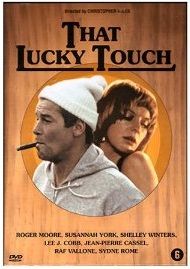| That Lucky Touch | |
|---|---|
 | |
| Directed by | Christopher Miles |
| Written by | Moss Hart John Briley Monja Danischewsky |
| Produced by | Dimitri de Grunwald Timothy Burrill |
| Starring | Roger Moore Susannah York Lee J. Cobb |
| Cinematography | Douglas Slocombe |
| Edited by | Tom Priestley |
| Music by | John Scott |
Production companies | De Grunwald Productions Gloria Film |
| Distributed by | Fox-Rank Allied Artists (US) |
Release date |
|
Running time | 89 minutes |
| Countries | United Kingdom West Germany |
| Language | English |
| Budget | £960,858 [1] |
That Lucky Touch is a 1975 British-West German comedy film directed by Christopher Miles and starring Roger Moore, Susannah York and Shelley Winters. [2] [3] [4]
Contents
The film was shot at Pinewood Studios, with location shooting around Brussels. The film's sets were designed by the art director Jack Maxsted. It was originally entitled Heaven Save Us from Our Friends. [5]